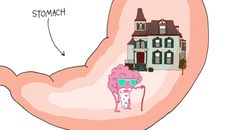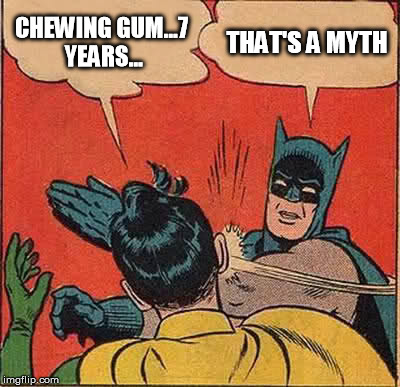We’ve all heard the story as kids: “Don’t swallow your gum or it will stay in your stomach for seven years!” I’m not sure how this knowledge began, but it sure scared me enough to keep me from swallowing my gum, in fear that my body would not be able to digest it. So does it really take seven years for your body to digest gum?
According to pediatric gastroenterologist David Milov of the Nemours Children’s Clinic, this myth has very little scientific backing. “If the legend were true,” Milov says, “that would mean that every single person who ever swallowed gum within the last seven years would have evidence of the gum in the digestive tract,” but colonoscopies and capsule endoscopy procedures turn up no such evidence. “On occasion we’ll see a piece of swallowed gum,” he says, “but usually it’s not something that’s any more than a week old.”
Rodger Liddle, a gastroenterologist at the Duke University School of Medicine, says that nothing could survive in the digestive tract that long unless the object was trapped in the stomach or intestines because it was too large.
The sugars in the gum are broken down in the digestive tract, but the gum base is not digestible. The FDA says that gum contains natural or synthetic elastomers, or rubberlike materials, as well as plasticizing softeners, resins and preservative antioxidizing agents. Some of the rubber-like substances found in chewing gum are the same rubber made to make inner tubes, so even if the gum wouldn’t stay in your system for seven years or cause you any real harm, it’s not advised (and doesn’t sound very appealing) to swallow it often. Gum passes through your system slower than other food that is meant to be consumed but will eventually come out the other end…pretty much the same as when it went it. An accidental swallow on occasion will cause your body no real harm.
However, if a person were to swallow many pieces of gum daily, it could cause constipation. Duke gastroenterologist Nancy McGreal, MD, also debunked this commonly heard myth. Gum will stick to your shoe, but not your intestine walls. A 1998 article in the Journal Pediatrics reports the cases of two kids who had constipation that required medical intervention. “In each case, the child was found to have swallowed chewing gum several times per day over a long period of time.”
So the old wives’ tale has been disproven. But nonetheless, it is not a wise decision to swallow mass amounts of chewing gum every day, so just throw it away!




My mom use to always tell me not to swallow my gum so I found this post really interesting! It is interesting that though gum isnt digestible it does not stay in our system. You would think that food items that are no digestible would stay in our system for a long period of time. Even though that this is a myth people still shouldnt swallow there gum I think. Overall good post, really interesting!
I remember hearing this from my parents years ago when I was very little. I swallowed gum a few times by accident but it was just never appealing to me to actually want to swallow it. I did however actually believe this myth and always wondered how long it would take for the gum to leave my digestive system. Gum is also nice for athletes because it keeps you relaxed and helps you focus (so it’s nice to know if they swallow it by accident then it won’t be harmful to them). I still won’t be swallowing my gum anytime soon though.
When I was a kid and kept hearing the saying “don’t swallow gum it will stay in you for seven years,” I never swallowed my gum. The thought that something could take that long to digest scared me into always spitting my gum out. Although this is a myth, just like you suggested in your post, does not mean it is a bad saying. It has stopped many kids from swallowing their gum at a young age. A little fear can get a young kid into doing something that is essentially better for their body otherwise many kids would not know better. Really great post, with a great idea!
Since I have heard this myth before, I was immediately intrigued into reading your blog post. I rarely ever swallow my gum, but I am relieved to understand that the myth is not true. However, I still find it dangerous that we would be chewing something in our mouth that is not digestible. An interesting study would be to test if sugar free or regular gum stayed in the digestive tract longer.